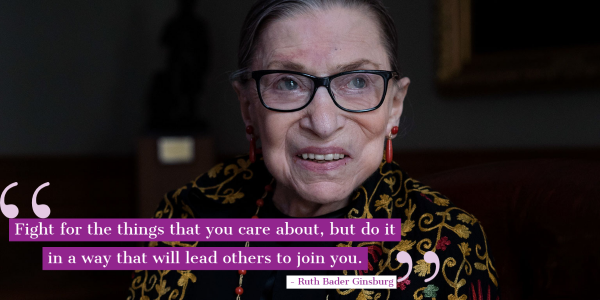
Ruth Bader Ginsburg’s Legacy
We lost an amazing champion of equality and prominent activist for women’s rights today. Justice Ruth Bader Ginsburg passed away at age 87 from complications due to cancer. Our hearts go out to her family and colleagues. She was a fixture of integrity, progressivism, and acceptance who graciously served the top court for nearly 30 years. May she rest in peace.
As we continue to grieve the loss of Ruth Bader Ginsburg, here is a historical timeline on her impact on women’s rights and her work for the LGBTQ+ community.
[emaillocker id=4438]
Before on the supreme court she served on the Women’s Rights Project of the American Civil Liberties Union, where she argued 6 cases at the Supreme court winning 5 of them. Her accomplishments include giving women the ability to sign contracts without a man co-signing, protections against gender-based denial in college admissions, extending the equal protections clause of 14th amendment to women, and allowing women to serve on juries.
United States v. Virginia, 1996
A court case that granted women the right to be admitted to Virginia Military Institute and thus not excluded from college admissions. In the majority opinion she wrote, “Women seeking and fit for a VMI quality education cannot be offered anything less, under the State’s obligation to afford them genuinely equal protection.”
Olmstead v. L.C., 1999
A victory for people with disabilities where the Supreme Court ruled that unjustified segregation of persons with disabilities constitutes discrimination in violation of title II of the Americans with Disabilities Act.
Romer v. Evans, 1996
A case in Colorado where voters passed a state constitutional amendment prohibiting queer people from being a protected class. After litigation, the Justice Department overturned the amendment with a 6-3 decision with Ginsburg joining the ruling declaring Amendment 2 of the Colorado State Constitution violated the equal protection clause. She also joined the ruling on 6-3 in Lawrence v. Texas 2003, in this case, the court struck down state laws criminalizing sodomy.
Windsor v. United States, 2013
A ruling that advanced same-sex marriage, Ginsburg joined the court towards equality and voted to strike down the anti-gay Defense of Marriage Act (DOMA). Paving the way for same-sex marriage to become legal years later under Obergefell v. Hodges.
Obergefell v. Hodges, 2015
In a 5-4 split, this is the case that lifted all state bans on same-sex marriage. Again, Ginsburg was on the right side of history and joined the ruling granting that “the right to marry is a fundamental right inherent in the liberty of the person and is therefore protected by the due process clause.” (https://www.britannica.com/event/Obergefell-v-Hodges)
Bostock v. Clayton County, 2020.
One of the last rulings Ginsburg was part of. In this case, the court decided that “an employer who fires an individual employee merely for being gay or transgender violates Title VII of the Civil Rights Act of 1964.”
[/emaillocker]

